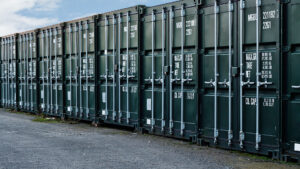As the negative effects of climate change on our planet become more and more apparent, businesses around the globe are increasingly appreciating the importance of implementing sustainable practices in their day-to-day operations.
In the UK, about 489,000 SMEs currently qualify as ‘green’, meaning they have taken steps and formal measurements to make their organisation more eco-conscious.
In this respect, it’s no wonder that shipping containers are gradually gaining popularity, especially in the transport, hospitality, and construction sectors. Thanks to their eco-friendly nature and structure, they can help you keep your carbon footprint in check while also reducing your monthly expenses.
But how exactly do cargo containers bring environmental benefits? Cleveland Containers, a leading shipping container expert that supplies more than 500 self-storage operators nationwide, lists some sustainable advantages of using shipping containers for your organisational needs.
Optimised transportation
Transport is the largest emitter of greenhouse gas emissions in the UK, contributing more than one-fourth of the country’s total emissions.
The good news is that, when it comes to transportation, shipping containers can be an effective solution to minimise your carbon footprint.
Paul Kell, SHEQ Director at Cleveland Containers, said: “No matter the shape or size, 10ft, 20ft, and 40ft containers are all designed to be weather-resistant and easily stackable, making them a great option for your transport needs.
“Shipping containers are uniquely designed to be stacked on top of each other, a practice exclusively reserved for transportation by sea on container ships. This optimisation of space allows for the efficient carriage of large volumes of cargo in a single voyage, reducing the need for multiple shipments, fuel consumption, and associated emissions per unit transported.”
Reduced waste
Shipping containers are made from steel, a durable material that can withstand all types of weather conditions.
The beauty of these cargo units is that they are built to last for many years, making them perfect and ready to reuse even after serving their original purpose in the shipping industry.
Whether for handy storage space for your business or as a temporary office on-site, shipping containers can be rehashed to suit a wide range of needs. This can significantly reduce the high levels of waste and resource consumption that come with constantly building and manufacturing new structures.
What’s also worth noting is that as well as being solid and sturdy, steel is a recyclable material. So, once the container has reached the end of its usable life, it can be dismantled and recycled to generate new products without ever going to waste.
Adaptability and flexibility
As mentioned, shipping containers are adaptable and flexible, so they can easily be repurposed to satisfy business requirements.
Paul Kell, SHEQ Director said “Need additional space to keep your specialist equipment safe? Or are you thinking about setting up a portable pop-up bar or restaurant?
“Shipping containers have a wide range of surprising uses and can be swiftly modified or expanded to tweak the design or offerings of your company.
“Due to their versatility, shipping containers can be converted into storage spaces, offices, or even retail shops, providing a sustainable solution as opposed to traditional building methods.”






